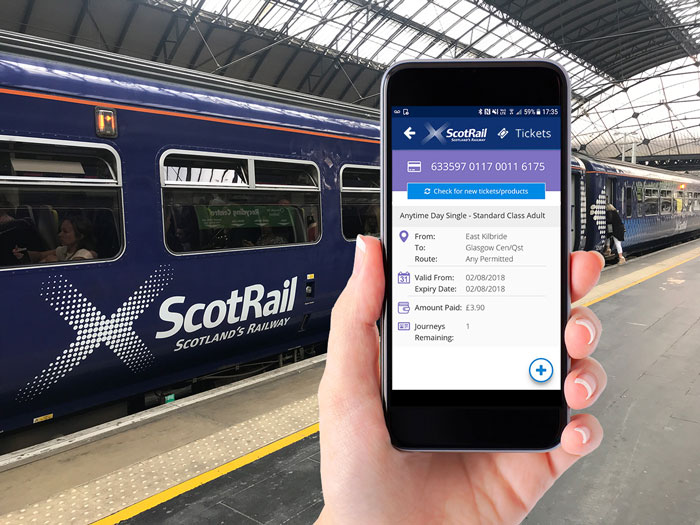ScotRail, the national rail operator for Scotland, has recently launched an innovative form of mobile ticketing across its network. The new solution has been delivered by Rambus and is built into ScotRail’s existing consumer app, which now enables customers to skip the queue at ticket vending machines by purchasing and downloading tickets directly to their smartphone.

The operator has an existing smartcard based customer deployment and whilst it has seen strong growth in uptake, there is still a significant volume of magnetic stripe tickets being issued. Issuing tickets, even to a smartcard often involves customers queueing at ticket vending machines and station desks each day. Offering customers the choice to self-serve using their mobile handset – which can also be used to ‘tap-and-go’ through station gates provides easier access to tickets and improves the overall travel experience, making it more convenient to make the switch from magnetic stripe tickets.
Is this the demise of the smartcard?
From an operator perspective, both smartcards and the automated fare collection systems they interact with provide valuable passenger travel data that was previously not obtainable from paper based ticketing. An operator can issue a paper ticket and never know if the ticket has been used. Access to travel data helps operators improve service provision and tailor ticket products for customers. The convenience of being able to use a smartcard for travel is a clear benefit for users of public transport. It’s reusable and it speeds up throughput of passengers through stations and onto their mode of transport. Smartcards were just the beginning of the smart ticketing evolution. The smartphone has now become a key part of our everyday lives and is a form factor that can bridge the gap between ticketing and other connected services. Making the leap from physical smartcard to virtual smartcard on our mobile phone creates exciting possibilities for both transport operators and their customers.
The journey to mobile
ScotRail recognized that some customers may want to continue using their physical card rather than switching to mobile, yet for others, applying for a card and waiting 10 days for it to arrive in the post seemed more cumbersome than continuing to use the more familiar paper based tickets. Having invested in an existing smart deployment it made perfect sense to deploy the Rambus mobile solution as it integrated seamlessly with their existing infrastructure and ticketing software systems with no ‘bolting on’ of additional hardware to enable mobile acceptance.
The Rambus mobile solution is based on Host Card Emulation (HCE), a technology already widely proven in the payments industry. According to The widespread deployment of NFC-enabled handsets will be a key driver in the mass adoption of mobile ticketing in the transport market.
A key differentiator for the Rambus HCE Ticket Wallet Service, (the product which works with NFC-enabled android devices and underpins the ScotRail mobile deployment) is that it’s based on interoperable open standards, in this instance on the UK wide interoperable standard called ITSO. So rather than deploying a payment focused mobile solution Rambus have created a ticketing focused mobile solution. What do we mean by this? There are unique requirements that transport operators and public authorities need to support in public transport. As an example, transport must be accessible to all demographics such as the unbanked and children – two groups who don’t have access to credit cards. Rambus already provide smartcard based ticketing systems which support public transport and enable all demographics to access travel so it was key for the mobile solution to also support this requirement for the transport market.
“Customers are increasingly expecting more innovative forms of ticketing and so transport operators are looking to smart phones as the point of delivery for new services. Delivering a modern and innovative transport experience that customers can rely on is a key driver for smart mobile ticketing,” said Russell McCullagh, Vice President and General Manager of Rambus Ticketing.
What’s Next for ScotRail’s mobile ticketing Expansion?
The rollout of the new mobile solution will be phased in over the coming months. Popular single and return tickets – which make up over 60 per-cent of ScotRail ticket sales – are the first products available to a number of pioneer customers using the updated ScotRail app, with a wider rollout to all customers planned in the near future.
“What ScotRail have launched is more than just another mobile ticketing solution, it’s a platform by which we can deliver greater convenience and ultimately provide greater interaction with our customers. We can build on this to create new opportunities and added services in future”, said Riz Wahid, ScotRail Head of Retail.


Leave a Reply